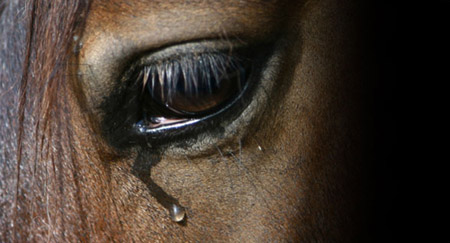
Thanks to my brother John Beal for forwarding this.
From CBS San Francisco
SAN FRANCISCO (KPIX 5) – Americans don’t eat horsemeat, but we do export horses for slaughter. Most end up on dining tables in Europe and China. While California is one of the few states that bans the exports, some activists have said the ban isn’t working.
We recently visited a Northern California Auction. Horses were on the block and selling cheaply; Prices were as low as $50 to $100, even former racehorses.
A horse known as Rino-U was bought by Tawney Preisner, who runs a shelter for horses.
“He was injured, he has a fractured knee, and he was no longer useful to the industry, so he was dumped,” Preisner said.
Just months before, the two-year-old thoroughbred was racing at Golden Gate Fields.
“It’s quite typical for someone to spend $150,000 on a horse, race it a few times, and if its not performing, just make it disappear,” said Preisner.
Preisner’s group, Horse Plus Humane Society, has rescued over 2,500 horses in the past decade – many of the animals were race horses that she found dumped at auctions.
“If they are lucky, they make it to an actual person that wants to help them and retrain them, but most times they go straight on to slaughter,” she said.
Livestock auctions are where horse traders known as “killer buyers” go to snap up horses for pennies on the dollar.
“It’s highly likely that kill buyers are going to scoop up horses that show up at auction,” said Cheryl Jacobson, who heads up equine protection for the Humane Society of the United States.
Jacobson said the auction process is known as the slaughter pipeline. From auction houses, the horses are then trucked to feedlots, and from there to slaughterhouses in Canada and Mexico.
“They are packed in there. They have long transportation times without food or water or rest,” Jacobson said.
She said even California horses, protected by law from slaughter, quietly disappear into the pipeline, simply by crossing first into neighboring states where exporting for slaughter is legal.
“It’s really easy to get around the system,” Jacobson said.
KPIX 5 found no one monitoring horse sales either. The California Department of Agriculture requires auctions to keep records, but the auction houses don’t have to report the transactions to the state. And the state admits there’s no budget for inspections.
On the night our KPIX 5 crew visited the auction, we noticed one person – who appeared to be an auction employee – buying up most of the horses for sale. The auction’s owner turned down a request for an interview, but confirmed the person was his employee, and does buy a lot of horses. He said it’s their business what they do with the animals.
So what about Rino-U? Like all thoroughbreds, he had a tattoo that auction houses are supposed to keep records of. We wanted to know who brought him in. The auction owner refused to show us his records. For Tawnee Preisner and her rescue group it’s all very frustrating.
His former owner never returned KPIX 5 calls, but his trainer said he gave the racehorse away for free to a man in San Jose whose name he doesn’t remember.
“It’s just swept under the rug, and no one cares. We are a civil country. We don’t just butcher our pets, but we are doing it to our horses,” said Preisner.
The auction employee denied sending any horses to slaughter, but said the horses are sold on the internet. And again, there is no documented evidence of killer buyers buying horses at the auction we attended.
